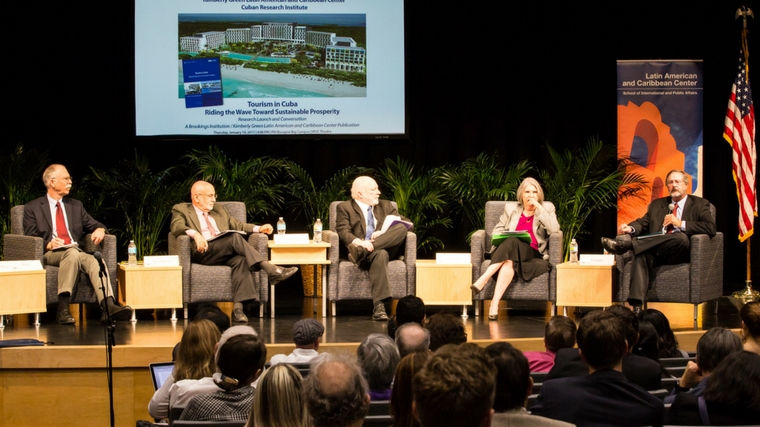Watch the full panel discussion at c-span.org.
By ASHLYN TOLEDO
The Chaplin School of Hospitality & Tourism Management partnered with the Brookings Institution and the Kimberly Green Latin American and Caribbean Center’s Cuban Research Institute to launch a new report on the future of the tourism industry in Cuba titled “Tourism in Cuba: Riding the Wave Toward Sustainable Prosperity.”
At the launch event, which took place at FIU’s Biscayne Bay Campus on Thursday, January 19, a panel of experts including co-authors Richard Feinberg and Richard Newfarmer, as well well Professor Jorge Duany, Director of the Cuban Research Institute, Professor Maria Espino from St. Thomas University and Professor John Thomas of the Chaplin School, discussed the findings in the report and delved deeper into some of the questions and uncertainties surrounding the Cuban government and its ability to participate in the global economy.
According to Feinberg and Newfarmer’s findings, Cuba will continue to see dramatic growth in demand within the tourism industry, spurred by significantly relaxed restrictions on U.S. travel to the island and a shifting global perception. In order to facilitate healthy and sustainable growth, the authors outlined several policy recommendations for both the Cuban and U.S. governments. However, because of Cuba’s complex international relationships and lack of government transparency, many of the panelists questioned the reliability of travel and economic data coming from the Cuban government.
“The Cuban government is not very open with this information, particularly since much of the Cuban tourism industry is actually run by the military,” said Thomas. “So it’s very difficult for economists to make an accurate evaluation of either existing resources, or what the potential is for future tourism.”
Nevertheless, Thomas, along with the other panelists, agreed with the overall conclusions and recommendations of the report.
Feinberg, whose recent book, “Open for Business: The New Cuban Economy,” explores many of the concepts outlined in his research findings, enjoyed that the discussion led to some interesting new ideas.
“The three panelists were very thoughtful, and each one had a relevant contribution to make,” Feinberg said. “There were some interesting angles suggested, varying all the way from from the role of the Chinese or the impact of Cuban tourism on Puerto Rico, to whether there could be the potential for medical tourism in Cuba.”
As the tourism industry continues to grow in Cuba, interest in research and investment, particularly from the South Florida and FIU communities, will likely follow.
“Tourism in Cuba is interesting because it has such a connection to Miami in general, and FIU in particular,” said Thomas. “The industry there is like a test of what tourism can be because it’s starting from almost nothing, and has the potential to grow very quickly. So, from an intellectual standpoint, we’re interested in taking a look at what’s happening there, and from a personal standpoint there are just so many connections between FIU and Cuba.”
Download Feinberg and Newfarmer’s full report here.
Download Cuba’s Future Hospitality and Tourism Business: Opportunities and Obstacles, a report by the Chaplin School’s Professor John Thomas and Professor Miranda Kitterlin-Lynch.







